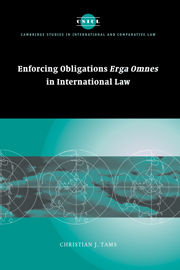Book contents
- Frontmatter
- Contents
- Foreword
- Preface
- Notes on citation
- Table of cases
- List of abbreviations
- Introduction
- Part I Background to the erga omnes concept
- 1 Clarifications
- 2 Traditional approaches to standing
- Part II Legal issues raised by the erga omnes concept
- Conclusion
- Bibliography
- Index
- Cambridge Studies in International and Comparative Law
2 - Traditional approaches to standing
Published online by Cambridge University Press: 24 July 2009
- Frontmatter
- Contents
- Foreword
- Preface
- Notes on citation
- Table of cases
- List of abbreviations
- Introduction
- Part I Background to the erga omnes concept
- 1 Clarifications
- 2 Traditional approaches to standing
- Part II Legal issues raised by the erga omnes concept
- Conclusion
- Bibliography
- Index
- Cambridge Studies in International and Comparative Law
Summary
In order to evaluate how the erga omnes concept has affected the international rules of standing, it is necessary to assess the status quo ante. The present chapter analyses whether international law prior to the Court's Barcelona Traction judgment recognised the right of States to respond to wrongful acts that did not affect them in their individual legal positions. Quite frequently, this is flatly denied. Following a popular analysis, traditional international law consisted of bilateral or bilateralisable legal rules, which gave rise to reciprocal rights and duties between pairs of States. Riphagen for example described traditional international law as ‘bilateral-minded’, while Verdross (in more guarded terms) spoke of the ‘essentially relative character of international obligations’. These characterisations were based on two propositions. First, States individually injured by breaches of international law have standing to respond. Secondly, their right to respond is exclusive. The first of these propositions has been addressed already; it is uncontroversial and remains true today. In contrast, it is highly contentious whether, prior to the emergence of the erga omnes concept, standing was limited to the defence of individual legal positions. This will be discussed in the present chapter.
A brief look into the classic treatises of international law shows that debates about standing in the general interest have a long history. Grotius' claim that kings ‘have the right to demand punishment not only on account of injuries committed against themselves or their subjects, but also on account of injuries which do not directly affect them but excessively violate the law of nature or of nations in regard to any persons whatsoever’ is only the best known but by no means the only early pronouncement on the issue.
- Type
- Chapter
- Information
- Enforcing Obligations Erga Omnes in International Law , pp. 48 - 96Publisher: Cambridge University PressPrint publication year: 2005

